Judgment in Paul and another v Royal Wolverhampton NHS Trust [2024] UKSC 1 was handed-down by the Supreme Court (‘the court’) on 11 January 2024, marking its first judgment of the year. The issue before the court was whether an individual could claim for psychiatric injury caused by witnessing the death – or other horrifying event – of a close relative as a result of earlier clinical negligence. The appellants had either witnessed or attended shortly after a death caused by the respondent’s negligence.
By a majority of six to one, the court dismissed the appeals. It held that, while doctors owe a duty of care to protect the health of their patients, they do not owe a duty of care to members of the patient’s close family to protect them against the risk of illness from the experience of witnessing the death, or medical crisis, of their relative from a condition which the doctor has negligently failed to diagnose or treat.
The court acknowledged that, while the general rule at common law is that a person cannot claim compensation for the effect on them of the death or injury of another person, an exception has developed which allows such compensation caused by witnessing an accident brought about by the defendant’s negligence.
However, the court rejected the argument that an analogy could be reasonably drawn between cases involving accidents and cases where the claimant suffers illness as a result of witnessing a death or medical crisis brought about by an untreated disease. It held that accidents are discrete events, whereas, in the medical context, there is often no event comparable to an accident as the symptoms of disease or injury may develop over days, months, or years. Commenting on the wider societal context, the court, at paragraph 139 of its judgment, stated:
‘The experience of seeing a person die or discovering their dead body is rarer today than it once was. Most deaths in the United Kingdom now occur in hospitals or other institutions such as care homes. But although social attitudes and expectations may be changing, we would not accept that our society has yet reached a point where the experience of witnessing the death of a close family member from disease is something from which a person can reasonably expect to be shielded by the medical profession. That is so whether the death is slow or sudden, occurs in a hospital, at home or somewhere else, and whether it be peaceful or painful for the dying person.’
Death, held the court, was not ‘an insult to health from which we expect doctors to take care to protect us, but a vicissitude of life which is part of the human condition.’.




Comments